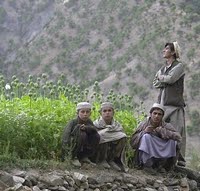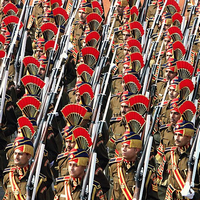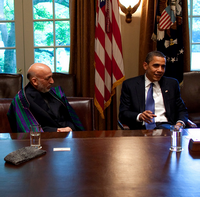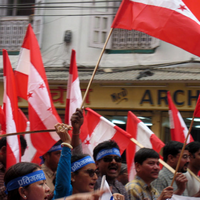When the Iranian revolution against the Shah Reza Pahlavi reached critical mass in late-1978, the United States found itself with very limited political leverage in Iran because of a longstanding U.S. commitment to ignore the country’s opposition politicians. Washington had considered this precondition an acceptable price to pay for the shah’s support of the West during the Cold War. But it backfired when the shah found himself facing a tidal wave of mullah-led unrest. The Carter administration, fearing the shah’s displeasure, simply waited too long to press him to replace his autocratic rule with a reformist government. In 1979, desperate […]
South Asia Archive
Free Newsletter

A mysterious crop disease has torn through the poppy fields of southern Afghanistan, leading Antonia Maria Costa, head of the United Nations Office for Drugs and Crime, to decrease the projection for the 2010 opium harvest by an astonishing 2,600 metric tons, or one-third of the national output. Scores of Afghan farmers have supported Costa’s claim, indicating that the opium harvest currently taking place in Afghanistan’s five main opium producing provinces will result in meager yields. The socioeconomic impact of the failed harvest comes at a precarious time, as thousands of international and Afghan troops are preparing to pacify the […]
Recent statements by the Indian Army have shown a softened stance toward the ongoing dispute with China along the Line of Actual Control — an area that has long been a source of tension for the two countries. In an e-mail interview, Douglas Paal, vice president for studies at the Carnegie Endowment for International Peace, explains the current situation along the China-India border. WPR: What are the core unresolved issues regarding the India-China border? Douglas Paal: The principal disputes are over territory. The Sino-Indian territorial dispute is one of China’s few remaining border disputes after a decade of resolving tough […]

A bus carrying around 60 passengers, including at least 20 local policemen, was winding through a thick forest in the eastern Indian state of Chhattisgarh on Monday when it suddenly exploded. At least 30 people were killed. Most of the rest were injured. Indian authorities were quick to pin the bomb attack on the country’s four-decade-old Naxalite-Maoist rebellion, named for Naxalbari, the town where the group first attacked government security forces in 1967. Naxalite fighters have been known to target security checkpoints along bus routes, and have warned bus operators not to allow police on board their vehicles. The Naxals, […]
Gen. Stanley McChrystal discusses his relationship with Afghan President Hamid Karzai, the possibility for reconciliation with the Taliban, and the future of U.S.-Afghan relations. McChrystal says that he expects the ongoing stabilization process in Marja to take several more months while he believes the effort needs to be largely Afghan-led.

Much of Afghan President Hamid Karzai’s activities in Washington this week will center on his efforts to secure American support, both diplomatic and financial, for his new peace plan — and specifically, the controversial issue of negotiating with the Taliban. The Afghan government and its foreign backers differentiate between reconciliation and reintegration. The former concept involves negotiating a political settlement with senior Taliban leaders who are willing to break with al-Qaida. By contrast, reintegration entails inducing lower-level Taliban fighters — who might have become Taliban fighters for non-ideological reasons, such as financial incentives — to stop fighting and return to […]
U.S. Principal Deputy Assistant Secretary for International Security and Nonproliferation Vann H. Van Diepen briefs the U.S. House Foreign Affairs Committee, Subcommittee on Terrorism, Nonproliferation and Trade on the current state of various Section 123 Agreements and other U.S. initiatives toward international nuclear cooperation. Diepen highlights talks with Vietnam for a 123 Agreement and a recent proposed arrangement with Delhi that would require India to put in place safeguards for handling U.S. reprocessed nuclear material.

THIMPU, Bhutan — Nepal’s Prime Minister Madhav Kumar Nepal returned home from the 16th South Asian Association for Regional Cooperation (SAARC) summit in Bhutan on April 30 to face a political crisis in his landlocked Himalayan nation. On May 1, the country’s former prime minister, the Maoist leader Pushpa Kamal Dahal (popularly known as Prachanda), began an indefinite general strike aimed at bringing down Kumar Nepal’s government. The ostensible reason was the latter’s almost-certain inability to meet a looming May 28 deadline for a new constitution, part of the 2006 peace agreement that ended a decade-long Maoist insurgency. But a […]
– If you’re wondering about the nuclear liability legislation that’s holding up implementation of the U.S.-India nuclear agreement, Pragati has a great backgrounder. – Ajai Shukla’s got a gem on how Pakistan is busy protecting itself in the NWFP from extremist militants that New Delhi is convinced are targeting India: Longstanding linkages still remain between the Pakistan Army and the jihadis it midwifed. And where both sides find a convergence of interests, they can still work together. But only in India does the belief still run strong that the Pakistani establishment controls and directs the jihadis in a meaningful way. […]
